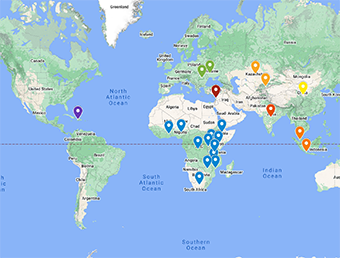
![]() The AIDS Research Centers (ARCs) Program at the National Institute of Mental Health (NIMH) seeks to foster a synergistic approach to research on mental health issues of HIV infection. Its goal is to encourage the application of multiple scientific perspectives and approaches to stimulate inter- and multidisciplinary collaboration and coordination. NIMH ARCs are broadly based investigative endeavors, encompassing or supporting research in a variety of areas, including biological, biomedical, behavioral, neuroscience, prevention, clinical sciences, and services research. Below is a list of the six funded NIMH ARCs:
The AIDS Research Centers (ARCs) Program at the National Institute of Mental Health (NIMH) seeks to foster a synergistic approach to research on mental health issues of HIV infection. Its goal is to encourage the application of multiple scientific perspectives and approaches to stimulate inter- and multidisciplinary collaboration and coordination. NIMH ARCs are broadly based investigative endeavors, encompassing or supporting research in a variety of areas, including biological, biomedical, behavioral, neuroscience, prevention, clinical sciences, and services research. Below is a list of the six funded NIMH ARCs:
Behavioral Research Center for HIV (BIRCH) at the University of Washington
 The Behavioral Research Center for HIV (BIRCH) at the University of Washington, funded by the National Institute of Mental Health, provides infrastructure and support for high-impact science on HIV and mental health and a research home for like-minded scholars. The Center emphasizes interdisciplinary research on the behavioral aspects of the epidemic, especially how they can better integrate mental health treatment into HIV prevention and treatment strategies. In addition, the Center offers technical assistance, training, and pilot funding as well as nurture the next generation of diverse HIV researchers through training and mentorship.
The Behavioral Research Center for HIV (BIRCH) at the University of Washington, funded by the National Institute of Mental Health, provides infrastructure and support for high-impact science on HIV and mental health and a research home for like-minded scholars. The Center emphasizes interdisciplinary research on the behavioral aspects of the epidemic, especially how they can better integrate mental health treatment into HIV prevention and treatment strategies. In addition, the Center offers technical assistance, training, and pilot funding as well as nurture the next generation of diverse HIV researchers through training and mentorship.Center for AIDS Prevention Studies (CAPS)
 Established in 1986, the Center for AIDS Prevention Studies (CAPS) at UC San Francisco is the world’s largest research center dedicated to social, behavioral, and policy science approaches to HIV. The mission of the Center for AIDS Prevention Studies is to conduct research to prevent new HIV infections, improve health outcomes among those infected, and reduce disparities.
Established in 1986, the Center for AIDS Prevention Studies (CAPS) at UC San Francisco is the world’s largest research center dedicated to social, behavioral, and policy science approaches to HIV. The mission of the Center for AIDS Prevention Studies is to conduct research to prevent new HIV infections, improve health outcomes among those infected, and reduce disparities. Center for HIV Identification, Prevention, and Treatment Services (CHIPTS)
 The Center for HIV Identification, Prevention, and Treatment Services (CHIPTS) leverages world class science to combat HIV globally, in partnership with communities, families, and individuals impacted by the pandemic. Strategies for integrating, promoting, and diffusing HIV detection, prevention, and care is our primary mission.
The Center for HIV Identification, Prevention, and Treatment Services (CHIPTS) leverages world class science to combat HIV globally, in partnership with communities, families, and individuals impacted by the pandemic. Strategies for integrating, promoting, and diffusing HIV detection, prevention, and care is our primary mission.Center for HIV and Research in Mental Health (CHARM)
 The Center for HIV and Research in Mental Health (CHARM) at the University of Miami aims to bridge the boundaries that have traditionally divided behavioral and biomedical research to catalyze mental health HIV science in one of the regions of the United States hardest hit by HIV/AIDS, with the over-arching theme of "Reducing the Impact of Mental Health and Minority Health Disparities across the HIV Prevention and Care Continua." CHARM offers the expertise, infrastructure, community partnerships, and resources necessary to build the momentum of mental health HIV science at the University of Miami to reduce HIV-related health disparities by optimizing bio-behavioral approaches for HIV prevention and care.
The Center for HIV and Research in Mental Health (CHARM) at the University of Miami aims to bridge the boundaries that have traditionally divided behavioral and biomedical research to catalyze mental health HIV science in one of the regions of the United States hardest hit by HIV/AIDS, with the over-arching theme of "Reducing the Impact of Mental Health and Minority Health Disparities across the HIV Prevention and Care Continua." CHARM offers the expertise, infrastructure, community partnerships, and resources necessary to build the momentum of mental health HIV science at the University of Miami to reduce HIV-related health disparities by optimizing bio-behavioral approaches for HIV prevention and care.Center for Interdisciplinary Research on AIDS (CIRA)
 The Center for Interdisciplinary Research on AIDS (CIRA) was established in 1997 and is currently New England's only NIMH-funded ARC. CIRA brings together scientists from 25 different disciplines and three institutions including Yale University, The Institute for Community Research and the Center for Health, Intervention, and Prevention. At Yale, faculty from five different schools participate in CIRA, including the Yale School of Public Health, Yale School of Medicine, Yale Law School, Yale Graduate School of Arts & Sciences, and Yale School of Nursing.
The Center for Interdisciplinary Research on AIDS (CIRA) was established in 1997 and is currently New England's only NIMH-funded ARC. CIRA brings together scientists from 25 different disciplines and three institutions including Yale University, The Institute for Community Research and the Center for Health, Intervention, and Prevention. At Yale, faculty from five different schools participate in CIRA, including the Yale School of Public Health, Yale School of Medicine, Yale Law School, Yale Graduate School of Arts & Sciences, and Yale School of Nursing.HIV Center for Clinical and Behavioral Studies
 Since it was first funded by NIMH in 1987, the HIV Center for Clinical and Behavioral Studies at the New York State Psychiatric Institute and Columbia University has brought together collaborators from Columbia University; other academic centers of excellence throughout the NY region and the world; and city, state, and international departments of health to work at the forefront of HIV behavioral and social science. HIV Center research addresses three overarching challenges: 1) individual vulnerabilities – mental illness, substance use, and health disparities – that facilitate risk and hinder adherence to prevention and care; 2) the need for behavioral and social science research to maximize the potential of biomedical prevention and treatment technologies; and 3) effective translation of research into "real-world" practice to close the gap among research, policy, and practice.
Since it was first funded by NIMH in 1987, the HIV Center for Clinical and Behavioral Studies at the New York State Psychiatric Institute and Columbia University has brought together collaborators from Columbia University; other academic centers of excellence throughout the NY region and the world; and city, state, and international departments of health to work at the forefront of HIV behavioral and social science. HIV Center research addresses three overarching challenges: 1) individual vulnerabilities – mental illness, substance use, and health disparities – that facilitate risk and hinder adherence to prevention and care; 2) the need for behavioral and social science research to maximize the potential of biomedical prevention and treatment technologies; and 3) effective translation of research into "real-world" practice to close the gap among research, policy, and practice.Penn Mental Health AIDS Research Center (PMHARC)
 The Penn Mental Health AIDS Research Center (PMHARC) strives to transform how individuals with comorbid mental illness and HIV/AIDS are treated and managed by developing innovative, interdisciplinary, and integrative approaches to optimize psychiatric, behavioral, and medical outcomes and achieving a better understanding of the biological, psychological, and behavioral mechanisms underlying these combined illnesses and treatments.
The Penn Mental Health AIDS Research Center (PMHARC) strives to transform how individuals with comorbid mental illness and HIV/AIDS are treated and managed by developing innovative, interdisciplinary, and integrative approaches to optimize psychiatric, behavioral, and medical outcomes and achieving a better understanding of the biological, psychological, and behavioral mechanisms underlying these combined illnesses and treatments.


